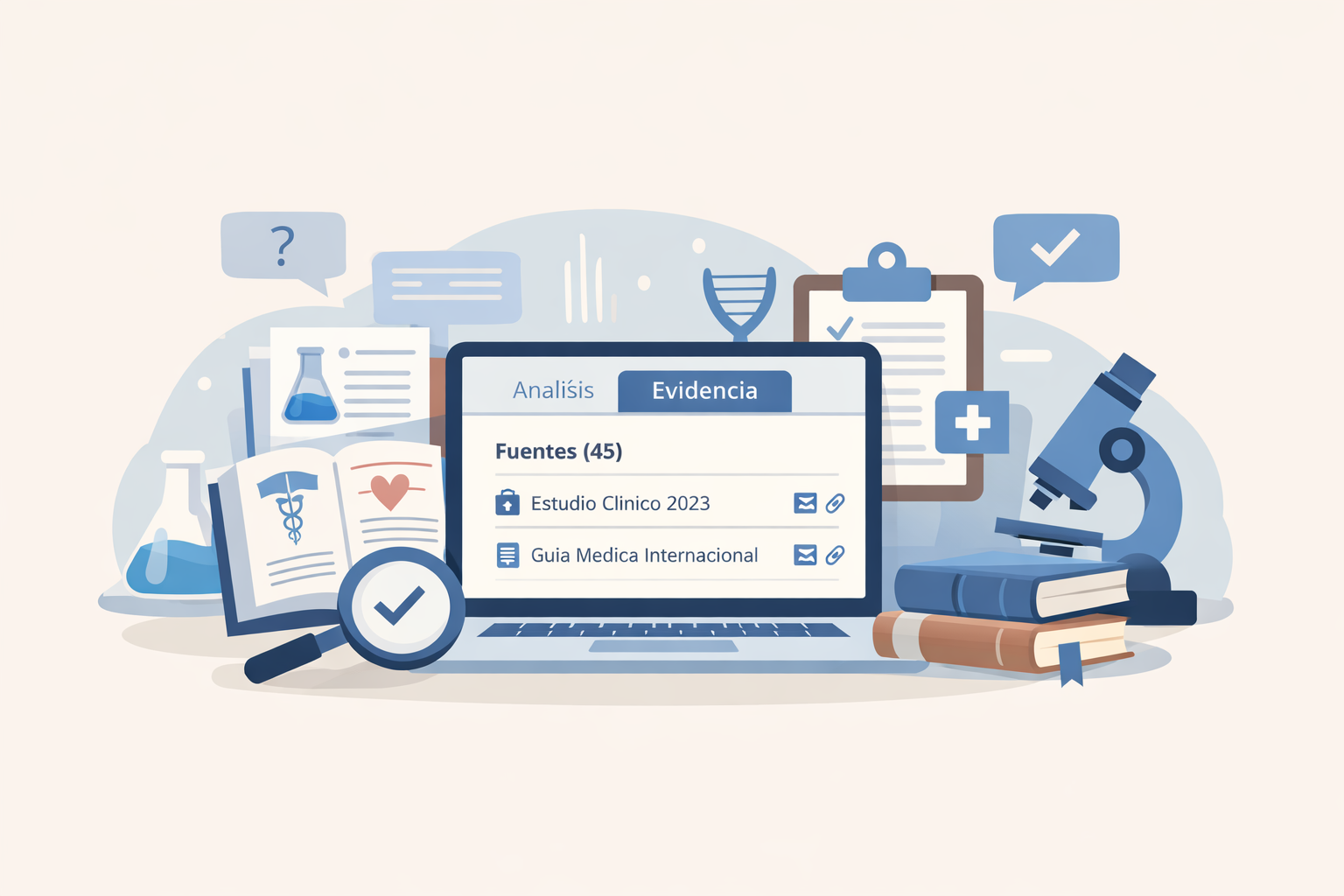Did you know that artificial intelligence systems are already reducing the time spent on administrative tasks in endocrinology by up to 70%? This advance changes the routine of many professionals, allowing them to devote more direct attention to their patients. Discover how new digital tools optimize documentation, improve diagnoses and strengthen communication in the modern endocrinology practice.
Table of Contents
- 1. Automation of medical notes with ia to save time.
- 2. Support in the diagnosis of chronic endocrine pathologies.
- 3. Intelligent alerts for early detection of decompensation.
- 4. Predictive analysis to anticipate relapses in chronic patients.
- 5. Secure integration of ia with existing clinical systems
- 6. Improved patient-physician communication through the use of the
- 7. Optimization of treatment management and adherence.
Quick Summary
| Conclusion | Explanation |
|---|---|
| 1. AI saves time in documentation | Automation makes it possible to transform long hours of notes into minutes, improving efficiency and quality. |
| 2. Accurate diagnosis with AI | AI systems identify complex patterns, improving early detection of endocrine pathologies. |
| 3. Early warnings for decompensation | AI monitors vital signs in real time, anticipating complications and improving medical intervention. |
| 4. Improved adherence to treatment | AI algorithms predict patient behaviors and send personalized reminders for better adherence. |
| 5. Optimized doctor-patient communication | AI translates complex information, facilitating clearer and more empathetic communication between physicians and patients. |
Automation of medical notes with AI to save time.
The automation of medical notes with artificial intelligence represents a quiet revolution in endocrinology clinical practice. Imagine transforming your long hours of documentation into accurate and efficient minutes.
According to a recent academic study, In addition, generative AI can transcribe patient-physician interactions and generate draft SOAP notes automatically. This process not only saves significant time, but also substantially improves the quality of documentation.
The system works by capturing the entire conversation during the query and using natural language processing algorithms to structure the relevant information. The benefits are manifold:
- Dramatic reduction of documentation time
- Increased accuracy in recording clinical details
- Freeing up time to focus on patient care
Today's technology allows these systems to learn from the specific context of each specialty. In endocrinology, this means understanding technical terms, hormonal conditions and particular treatments with amazing precision.
Systems such as PhenoPad demonstrate how AI can capture not only voice but also handwriting, instantly transforming it into digital notes integrated into the patient's electronic record.
To implement it, look for specialized medical documentation AI solutions that offer:
- Integration with your existing record keeping system
- Compliance with privacy regulations
- Learning and customization capabilities
Automation does not replace your medical judgment. It empowers your ability to provide more humane and detailed care.
2. Support in the diagnosis of chronic endocrine pathologies.
Artificial intelligence is transforming the diagnosis of chronic endocrine pathologies through predictive analytics and early detection of complex patterns that the human eye might miss. A silent but powerful technological ally for endocrinology professionals.
According to recent research, AI offers unique capabilities for improve early diagnosis and personalize treatments. Machine learning systems can analyze large volumes of medical data, identifying subtle connections that enable a deeper understanding of endocrine diseases.
How AI diagnostic support works:
- Analysis of complete medical records
- Identification of non-obvious risk patterns
- Prediction of possible complications
- Comparison with global databases of similar cases
In practice, these systems can help you detect conditions such as diabetes, thyroid problems or polycystic ovary syndrome with significantly greater accuracy. AI does not replace the physician, but acts as a powerful diagnostic assistant.
For better understand the differential diagnosis, It is essential to understand that AI processes information systematically and objectively. It can simultaneously consider hundreds of variables that would take a professional days to analyze.
Some additional benefits include:
- Reduction of diagnostic errors
- More precise treatment customization
- Early identification of potential risks
- Continuous monitoring of disease evolution
The key is to view AI as an intelligent collaborator that amplifies your diagnostic capability, not as a replacement for your clinical expertise.
3. Intelligent alerts for early detection of decompensation.
Early detection of decompensation in endocrine pathologies can mean the difference between a successful intervention and a serious complication. Artificial intelligence is revolutionizing this capability through intelligent warning systems that continuously monitor risk indicators.
According to recent research, AI devices can remotely monitor vital signs and metabolic markers, generating alerts before symptoms become apparent. This capability represents a quantum leap in chronic disease monitoring.
Key components of intelligent alerts:
- Predictive analysis of clinical data
- Continuous real-time monitoring
- Identification of risk patterns
- Personalized notifications
AI systems can simultaneously process hundreds of variables, detecting subtle changes that might go unnoticed in traditional monitoring. For example, in diabetes, they can anticipate a possible glycemic decompensation based on microchanges in continuous recordings.
For explore more about how artificial intelligence is transforming medicine, It is essential to understand that these tools do not replace the professional, but rather enhance him or her.
Main benefits:
- Reduction of emergency hospitalizations
- Faster and more precise medical intervention
- Better quality of life for chronically ill patients
- Proactive rather than reactive monitoring
A practical example would be a patient with thyroidism who receives an alert before his or her hormone levels become completely destabilized, allowing early adjustment of treatment.
The key is to integrate these technologies as a complement to medical judgment, not as a replacement. Clinical expertise remains irreplaceable.
4. Predictive analysis to anticipate relapses in chronic patients.
Patients with chronic endocrine diseases require constant and personalized follow-up. Artificial intelligence is revolutionizing this area through predictive analytics that can anticipate relapses before they occur, fundamentally transforming preventive medicine.
According to recent research, AI algorithms can analyze complex patterns in clinical data, identifying early signals of potential decompensation. This approach not only predicts risks but also enables personalized proactive interventions.
Key elements of predictive analytics:
- Continuous evaluation of clinical markers
- Complete medical record processing
- Identification of individual risk patterns
- Generation of preventive alerts
A concrete example would be a patient with type 2 diabetes, where AI can detect microchanges in glucose, adherence to treatment and other indicators suggesting potential decompensation.
For build an automatic and more accurate medical record, These systems integrate information from multiple sources, creating dynamic and personalized risk profiles.
Main benefits:
- Reduction of emergency hospitalizations
- Earlier medical interventions
- More personalized treatments
- Improved quality of life for patients
Algorithms can even predict the risk of therapeutic noncompliance by analyzing behavioral patterns that suggest possible treatment interruption.
The key is to view these systems as collaborative tools, not as replacements for medical judgment. The expertise of the practitioner remains critical in interpreting and acting on these predictions.
5. Secure integration of AI with existing clinical systems
Integrating artificial intelligence into clinical systems requires much more than just technology. It means ensuring security, privacy and compatibility without disrupting established medical workflows.
Endocrinology professionals need technology solutions that fit seamlessly into their current systems without creating additional complexity. AI should function as an intelligent complement, not as an administrative burden.
Fundamental principles of secure integration:
- Compatibility with existing electronic records
- Robust data security protocols
- Minimal interference in clinical processes
- Strict compliance with privacy regulations
According to recent academic studies, responsible implementation of AI requires deep ethical considerations, including managing potential biases and ensuring the representativeness of the data used.
Upload clinical files and enable their automatic integration represents a perfect example of how technology can simplify, not complicate, medical work.
Key strategies for effective integration:
- Pre-assessment of technological compatibility
- Pilot tests in controlled environments
- Staff training
- Informed consent mechanisms
- Customization and adjustment options
True innovation does not lie in replacing professionals, but in enhancing their capacity for care and diagnosis. AI should be a tool that simplifies, not complicates.
A truly useful AI system adapts to the professional, it does not force the professional to adapt to it. Security, privacy and usability are the three fundamental coordinates in this integration.
6. Improving doctor-patient communication through AI.
Communication is at the heart of any medical practice. Artificial intelligence is transforming this interaction, enabling clearer, more empathetic and personalized communication between doctors and endocrinology patients.
In endocrinology, where chronic conditions require continuous follow-up, effective communication can make the difference between treatment success and failure. AI acts as a bridge that facilitates this communication, translating complex information into understandable messages.
Key functions of AI in medical communication:
- Generation of comprehensible query summaries
- Identification of nonverbal language and emotional tone
- Translation of complex medical terms
- Personalized follow-up of patient's doubts
Optimize queries with new functions allows professionals to focus more on the human connection and less on administrative tasks.
Benefits for patients:
- Greater understanding of your medical condition
- Feeling of being heard and understood
- More accessible and personalized information
- Reduction of anxiety due to lack of knowledge
A practical example would be a system that helps explain hormone test results in a simple way, using analogies that the patient can easily understand.
Technology does not replace human empathy. Its function is to enhance communication, not to automate it. The ultimate goal is to create a bridge of mutual understanding between doctor and patient.
7. Optimization of treatment management and adherence.
Adherence to treatment represents one of the greatest challenges in the management of chronic endocrine diseases. Artificial intelligence is emerging as a strategic ally to transform this reality, offering personalized and intelligent solutions.
Machine learning models can predict patient behavior patterns with high accuracy, identifying risks of therapeutic noncompliance before they occur. This capability represents a fundamental change in treatment management.
AI strategies to improve adherence:
- Personalized medication reminders
- Predictive analysis of risk behaviors
- Intelligent monitoring systems
- Real-time adaptive feedback
Automatically detect drug interactions prevents complications and reinforces the safety of the treatment.
Key benefits for patients and physicians:
- Reduction of relapses
- Better understanding of adherence patterns
- Personalized early interventions
- Optimization of therapeutic schemes
Clinical studies reveal that these systems can predict adherence with accuracies better than 90%, radically transforming the monitoring of chronic treatments.
Technology does not seek to replace the doctor-patient relationship, but to enhance it. The ultimate goal is to create a more intelligent, comprehensive and individual-centered ecosystem of care.
This table summarizes the main advances and benefits of the use of artificial intelligence in endocrinology discussed in the article.
| Area of Application | Description | Key Benefits |
|---|---|---|
| Automation of medical notes | Use of AI to transcribe interactions and create SOAP notes automatically. | Reduced documentation time, improved accuracy and more time for patient care. |
| Diagnostic support | Data analysis to identify non-obvious patterns and personalize treatments. | Early diagnosis, personalization of treatments, reduction of diagnostic errors. |
| Intelligent alerts | Real-time monitoring of risk indicators with AI. | Faster interventions, better quality of life, reduction of emergency hospitalizations. |
| Predictive analytics | Anticipation of relapses in chronic patients by means of AI. | Early interventions, personalized treatments, prevention of complications. |
| Secure integration with existing systems | Compatibility and safety in the integration of AI with clinical systems. | Minimal process interference, robust security protocols, privacy compliance. |
| Improved patient-physician communication | Use of AI to facilitate empathetic and understandable communication. | Better patient understanding, reduced anxiety, more accessible information. |
| Optimization of treatment adherence | Prediction and monitoring of adherence patterns with AI. | Reduction of relapses, personalized interventions, better treatment management. |
Enhanced monitoring in endocrinology with AI-based solutions
Efficient and personalized management of endocrinology patients is a major challenge that requires intelligent tools to optimize time and reduce errors. This article highlights the 7 ways in which artificial intelligence improves documentation, diagnosis, communication and treatment adherence, key aspects to achieve quality, patient-centered care.
At Itaca.ai, We understand these challenges and offer a platform designed to transform your clinical practice. With features such as instant SOAP note generation, artificial intelligence-based diagnostic support and secure integration with existing systems, you can reduce the administrative burden and focus on what matters most: human care. Discover all the tools and new features we have for you in our New Functions and delves into how to take advantage of AI in our Guides.

Do you want to revolutionize your patient follow-up with smart and proven solutions? Don't wait any longer to free up your time, improve accuracy and provide more humane care. Visit now Itaca.ai and discover how artificial intelligence can transform your endocrinology practice.
FAQ
How can AI help in the automation of medical notes in endocrinology?
AI can transcribe patient-physician conversations and automatically generate draft SOAP notes, significantly reducing documentation time. Implement a specialized AI system that integrates with your electronic records system to save time in consultations.
How does artificial intelligence improve the diagnosis of endocrine pathologies?
AI can analyze large volumes of medical data and detect complex patterns that may indicate endocrine diseases. Start incorporating AI tools into your practice to identify conditions like diabetes more accurately and in less time.
What are the benefits of smart alerts for patients with endocrine diseases?
Smart alerts can continuously monitor vital signs and generate notifications before symptoms of decompensation arise. Establish an intelligent monitoring system that reviews risk indicators to enable faster interventions.
How does AI help to anticipate relapses in patients with chronic diseases?
AI algorithms analyze medical histories and behavioral patterns to predict relapses before they occur. Consider implementing predictive analytics that evaluate your patients' clinical markers to increase the likelihood of proactive interventions.
What steps should I take to integrate AI into my endocrinology clinical practice?
AI integration requires ensuring compatibility with your electronic record, as well as data security. Evaluate available technologies, pilot test and train staff to ensure a smooth transition to the use of AI in your healthcare.
How can AI optimize physician-patient communication?
AI can generate query summaries and translate complex terms, facilitating clearer communication. Use AI-based tools to improve patient understanding of their condition and encourage more effective information exchange.





Leave a Reply